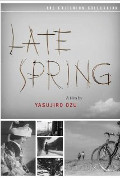
Directed by
Yasujiro Ozu
108 minutes
Rated G
Reviewed by
Bernard Hemingway

Late Spring
Late Spring is a film of great simplicity and is typical of its director’s trademark preoccupation with the mundane lives of ordinary people. Made only four years after the end of the war, that experience forms the backdrop to the narrative. Whether it is visible as a roadside sign encouraging passers-by to "Drink Coca-Cola" or the high incidence of young widows and widowers, or the contrast between the traditional lifestyle of the father-daughter and the latter’s Westernized friend, the shift in Japanese post-war society and culture is a central concern to Ozu in this film as was also the case with other of his films of the period such as The Flavour Of Green Tea Over Rice.
Professor Shukichi Somiya (Chisyu Ryu) lives with his 24 year-old daughter, Noriko (Setsuko Hara) who looks after their household . Both are happy with the arrangement but Shukichi, spurred by an old family friend (Masao Mishima) and his pushy sister (Haruko Sugimura), realizes that it is time for his daughter to have her own life. In what to Western eyes appears to be an unavoidably Freudian response Noriko prefers to live with her father and expresses a revulsion that her father’s friend has re-married.
No doubt that there are aspects here that will resonate more for a Japanese audience (for whom a tea ceremony, an extended extract from a Noh performance and a visit to the famous Zen garden at Ryoanji temple in Kyoto will be more than mere signifiers of traditional Japaneese culture) and although the film now appears to be rather quaint in the realization of its story it needs to be seen within the social context of its time and Ozu's evolving aesthetic to be appreciated.
Want something different?





